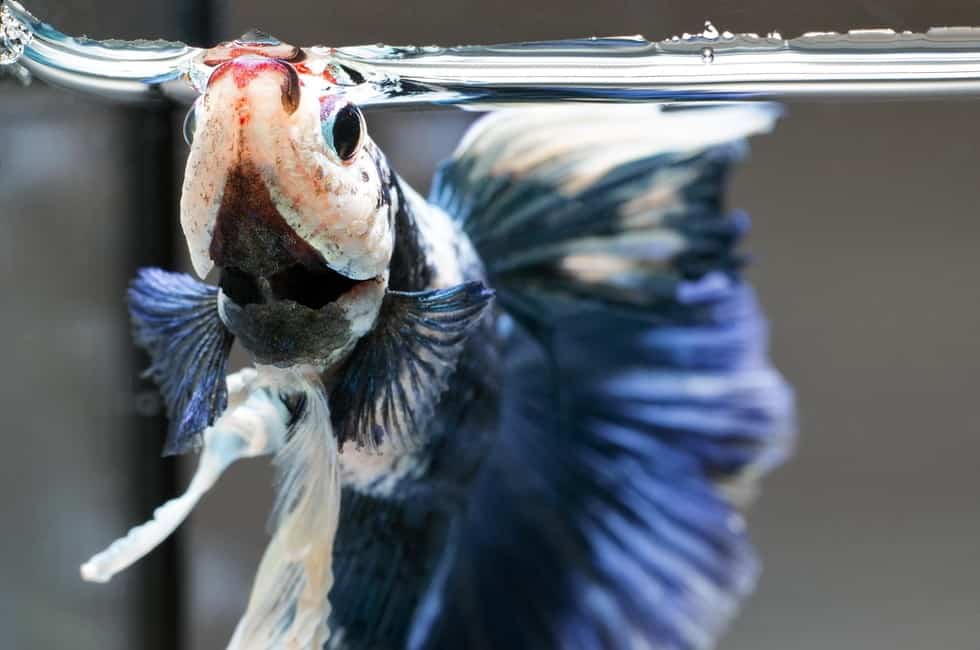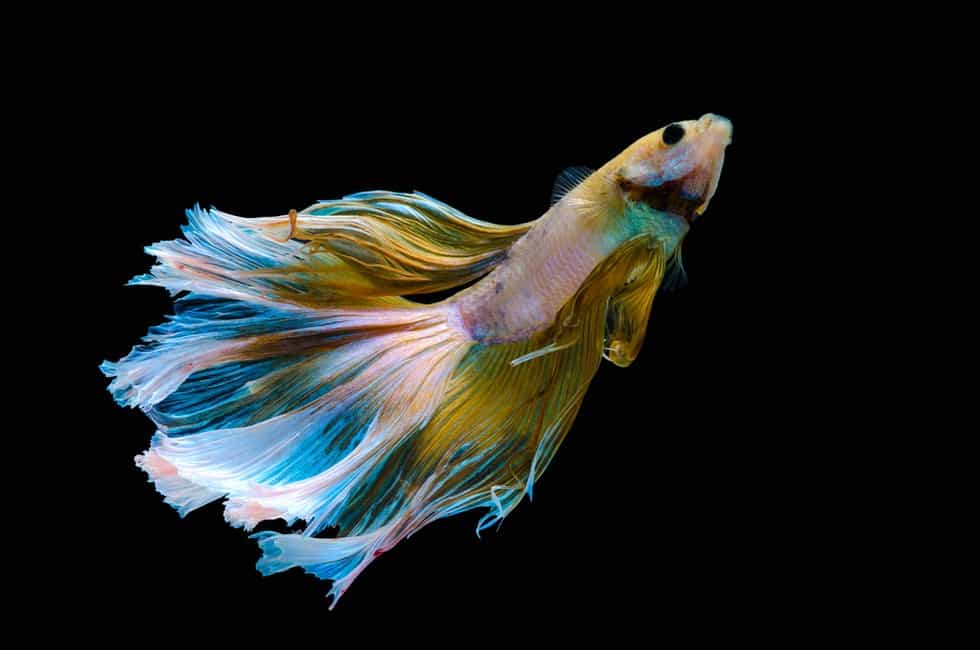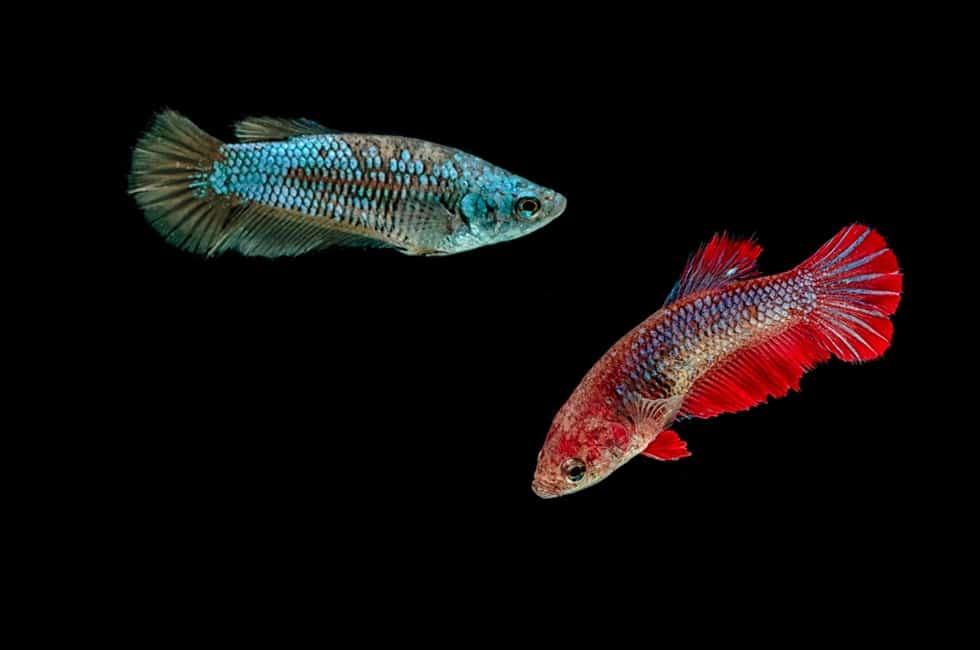Fish are casually mistaken for pets that are easy to look after. The reality is, like any other animal you might bring home, fish require care and effort. The difference is that there is no way for fish to signal you that something is wrong compared to dogs and cats, for example. You have to find that out through careful observation.
With this said, why won’t your Betta eat? There is a wide variety of reasons that could lead to that. Most commonly, this happens due to stress, overfeeding, and a number of diseases.
Luckily, the majority of causes are completely curable and do not require too much effort and funds.
Here is a small list of all reasons before we go more in-depth:
- Stress from the new environment
- You Overfed your Betta
- Betta does not like the food
- Aquarium Conditions
- Diseases
For all causes, diseases, and contaminants which cause appetite loss, read below. With hopes that you find the corresponding issue, we have provided sufficient details on how to react and treat each case.
Possible Causes And Their Corresponding Cures
A common worrying issue for pet owners is when their animals refuse to eat. With fish, for example, that is something that has happened to anyone at least once. Our goal today, is to take a careful in-depth look at all the possible causes for Betta Fish to stop eating, and how to cure them.
Understandably, when your pet refuses to eat, you get worried. However, with Betta fish, the causes are not necessarily dangerous. Commonly, Betta fish show signs of appetite loss during the first few days in a new aquarium.
If your Betta fish has just recently been bought and moved to your tank, there are a couple of reasons why it would refuse to eat.
Firstly, placing your Betta to a new environment brings imminent stress. Not only are you changing its home, but you are placing it in completely different water in terms of parameters.
The second reason with new Betta fish is the change of food. While you can always ask the seller in the pet store about the food they fed Bettas with, in most cases, you will use a different one. In such situations, if the fish does not get used to it in a few days, try out a new type of food.
In the case of older fish suddenly refusing to eat, the reasons could be quite more dangerous. These situations require a lot of observation and problem-solving.
Firstly, you need to take your own actions into account. Did you overfeed your Betta? Did you clean the aquarium well enough?
When you answer those questions, look for notable changes in behavior or appearance in your Betta, and connect them to the correct disease.
For example, are there any changes in color, does it look tired and slow, does it have any new marks that did not exist previously?
Symptoms depend on the different types of sicknesses. Luckily, the majority of diseases, that among anything else, result in appetite loss, are treatable.
Furthermore, not only are the majority of diseases curable, some of the sicknesses can also pass by themselves. Below, you can separately read more about the different situations with newly bought fish, mainly caused by stress, and with older Bettas, when the reason is most likely a disease.
Stress From The New Environment
Stress is common for all types of pets in the first days after adoption. No matter if is a dog or a fish, it is a normal state which requires time to pass.
A good thing is that Bettas are adaptive but it will most likely take a few days. There is no written rule that your Betta necessarily needs to be stressed in a new tank but it is highly likely.
There are ways to reduce stress for a new Betta. For example, fish do not only react to events in the tank, they also react to everything happening outside.
The best option is to either place the tank at a more chilled spot in the house/office or cover it with something for the first few days.
Darkness will make your Betta feel a lot more secure. Of course, if you have a large tank, just turn off the lights during some periods of the day.
You Overfed Your Betta
Logically, fish have extremely small stomachs. They require the smallest amounts of food to be happy and healthy. The most positive way to feed your Betta is with small portions.
This way, you can be sure that it will not stop eating. Plus, you can’t always watch the tank. Bettas will also eat when you are not looking.
This means that you do not need to give them more and more food every time you pass near the aquarium. Remember, the stomach of a Betta is about the size of its eyes, possibly a little bit larger. Commonly, Bettas have digestive problems and overfeeding them can lead to much more serious diseases.
Your Betta Does Not Like The Food
While this could happen to older Bettas as well, it is most common with newly adopted fish in their new aquariums. There are simple ways to prevent such situations.
You cannot expect your Betta to jump on flakes if it is used to pellets. Commonly, you will end up buying a completely different type of food than it is used to.
Your best option is to ask the previous owner about the food, no matter if it is a pet store or a single person. Ask them about the type of food they have fed the Betta until now.
Furthermore, this can have a huge impact on the stress levels of your new fish. As we already said, the new environment is significant enough for appetite loss, therefore changing the food will deepen the issue by a great lot. Stick to the original food and save your Betta from the extra stress.
Aquarium Conditions
To secure the well-being of your Betta, you first need to know its environmental requirements. Bettas depend on the water temperature in the tank.
This means that their metabolism will work according to how warm or cold it is. If the water is as hot as it needs to be, their metabolism will work faster and they will eat more.
Normally, Bettas should be kept at temperatures between 24°C and 26°C. If the water is colder, their metabolism will slow down and they will not be as hungry.
Also Check: How to Clean a Betta Fish Tank
Finally, water parameters are key for any species of fish. Testing the water regularly is your responsibility. With Bettas, the suggested water parameters are the following:
- pH between 6 and 7.5
- Water hardness from 5° to 20° dH
- Nitrite – 0 ppm
- Nitrate – <40 ppm
- Ammonia – 0 ppm
*ppm – parts per million
Diseases
The final cause of appetite loss could be a growing disease in your Betta. While it is highly unlikely that this happens to newly adopted fish, if your old Betta suddenly stops eating, the cause is possibly one of the following illnesses.
Some diseases require nothing but time. Others, however, will need remedies from the pet store. In the end, you can always take your fish to the vet and do all necessary examinations.
Before you decide to cause all this stress to your fish and spend a lot of money, here are the main diseases that have appetite loss as a symptom:
Bacterial Infection
Possibly the most common disease of all, a bacterial infection occurs when the aquarium is not filtered. A dirty environment leaves a lot of breeding ground for unhealthy bacteria.
The most common symptoms here are appetite loss, color changes, lethargy, holes within the skin, red patches. Treatment is simple. You need to change at least 70% of the water frequently. Furthermore, you need to clean every inch of your aquarium and invest in a better filtration system.
VELVET
Velvet is the deadliest parasite for Bettas. The symptoms are really hard to catch. What you will be looking for is a rust-colored mist around your Betta.
For best results, use a flashlight. A more significant symptom will be your Betta scratching itself on random objects. The best decision here is to quarantine your Betta in a different tank and treat it with Bettafix.
BACTERIAL SEPTICEMIA
Although it is one of the more dangerous diseases, it is easy to spot. What you will be looking for are bloody red streaks all over the body of the Betta. Apart from that, of course, appetite loss and lethargy are also common for this sickness.
In order to react accordingly, quarantine your Betta and take it to the vet. For this sickness, you will need prescribed medications.
Related Questions
Why isn’t my Betta eating his food?
This could be due to high levels of stress, overfeeding, or a disease. If your fish has been moved to the aquarium recently, it could still be stressed and refusing to eat.
Apart from that, if you have given her a new type of food, it will take time until the Betta gets used to it. Finally, if it is an old Betta and it stops eating, there is a high chance that it is growing some type of sickness.
Such illnesses could be Bacterial Infections, Velvet or Bacterial Septicemia.
Can a Betta Fish go 3 Days Without Food?
Bettas can survive a lot longer than 3 days without food. In fact, it can take several weeks before they starve to death. Do not be worried if your Betta has not eaten in a couple of days.
How Do You Know If Your Betta Fish Is Dying?
There are a few significant symptoms of a dying Betta fish. Firstly, its colors will fade away. The fins will shrink, it will get lethargic and stop swimming at all.
Of course, it will also lose appetite. You can expect to see white spots all over their bodies and falling scales. Of course, some diseases have these symptoms as well.
However, have in mind that Bettas normally live 2-4 years. If so much time has passed, sicknesses that also encompass these symptoms are less likely to be treated.
How many days can a Betta fish go without food?
A Betta fish can survive for up to two or three weeks before they starve to death. Especially, if it has been overfed and it lives in colder water.
Still, overfeeding your Betta could lead to major health issues as this species has common digestive problems. The healthiest option for a Betta is to be fed a pinch of flakes/pellets two or three times a day. Literally, smaller portions but more frequently.
My Betta won’t eat and barely moves.
Before anything else, check your water temperature. Bettas get lethargic when the water is too cold and their metabolism becomes slower.
In this case, they will not move too much and would rarely eat. If this is not the case, observe for any other notable changes in color, marks.
Your Betta could be suffering from some type of sickness. The worst case scenario, your Betta could be very old and at the end of its life.
New Betta fish not eating?
This could be due to two reasons. The first and main one is stress. The change of environment will have a huge impact on your Betta. Although this species of fish are rather adaptive, it will still most likely take days. Through this time, it might refuse to eat.
The second reason will be food. As you sure that you are giving it the same food that it has been fed in the pet store? If you change the type of food, the Betta will need time to adjust and get used to its new meal.
Do not forget that Bettas will eat when you are not around, so do not take any other sort of action until you are completely sure it does not eat. However, if in a week you continue to think it completely refuses to eat, try a different type of food again.



